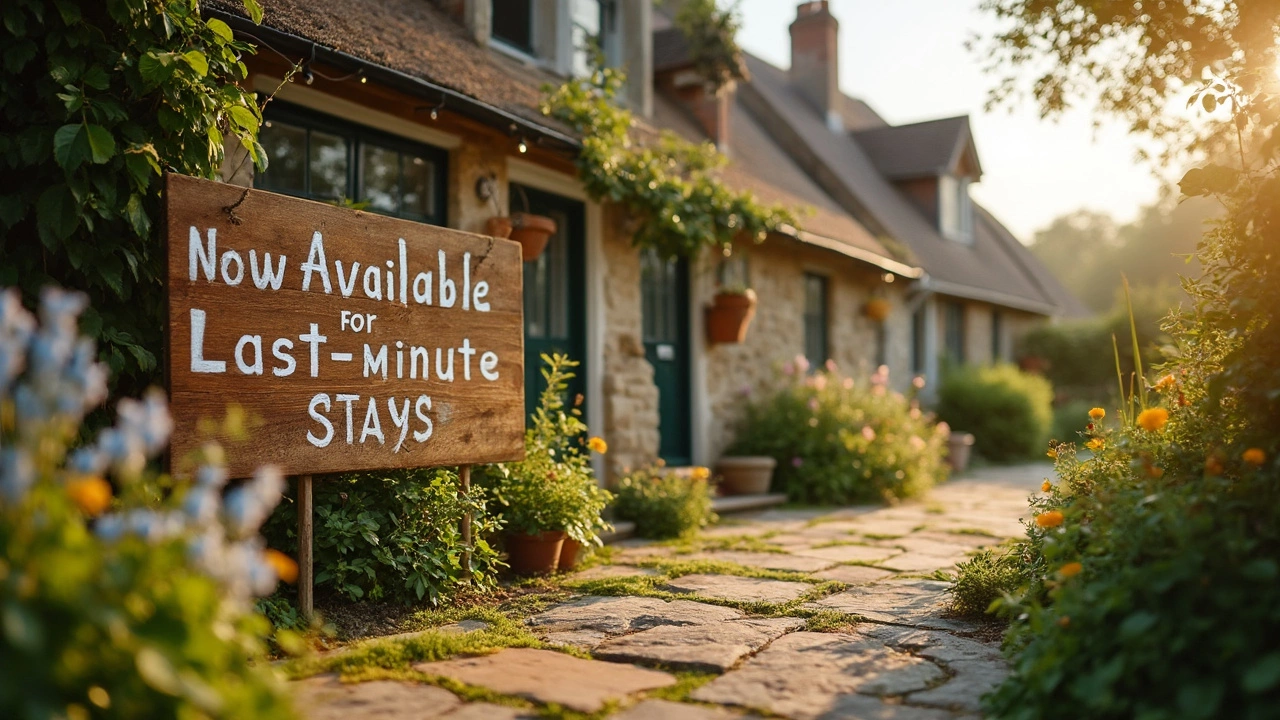People talk big about making money off cottages, but does it really pay off, especially in the last-minute rental game? Cottage rentals can look like an easy cash grab—just hand over the keys and sit back while the bookings pile up. But the reality is, it’s more like running a small business than hosting friends for a weekend.
If you’re considering listing your cottage for those last-minute travelers, it’s smart to know exactly what you’re getting into. There are clear opportunities, like filling up open weekends or tapping into spontaneous getaways when everyone is scrambling for a place. But where you make—or lose—money comes down to more than the nightly rate. Management fees, cleaning costs, and even key handoff hassles add up fast.
Before you post those glossy photos, let’s talk real numbers, real risks, and what you have to actually do if you want those last-minute bookings to mean payday rather than frustration. Setting up your cottage for profit isn’t rocket science, but it does take strategy, quick responses, and knowing what to charge without scaring folks off.
- The Cold, Hard Numbers: What Can You Really Earn?
- Hidden Costs No One Warns You About
- Making the Most from Last Minute Bookings
- Big Mistakes and How to Dodge Them
- Pro Tips for Squeezing Out More Profit
The Cold, Hard Numbers: What Can You Really Earn?
This is where you cut through the hype. What people actually make on cottages depends on a bunch of things—location, season, how often you rent, and how fancy (or basic) your place is. If your cottage is by a popular lake or not far from a city, you’re already ahead. But let’s break it down with some actual numbers, not just wishful thinking.
On regular weekends, most average cottages in the UK can pull in between £100 and £300 per night if you nail your listing and photos. Peak summer weeks or a holiday period? That can easily double, especially if you accept last minute bookings. A small but cozy place in a tourist hotspot could take home over £1,000 for a jam-packed holiday week, while larger places can clear £2,000–£3,000 during high demand. But the dream of full calendars isn’t reality for most owners. Even top places see about 65-75% occupancy on average.
The table below gives a rough idea of earnings for typical last minute cottage rentals in the UK:
| Type of Cottage | Nightly Rate (£) | Peak Week Earnings (£) | Average Occupancy (%) |
|---|---|---|---|
| Basic Cottage (2-4 guests) | 100-150 | 700-1,000 | 60% |
| Family Cottage (4-8 guests) | 150-300 | 1,200-2,100 | 70% |
| Premium/Luxury (8+ guests, hot tub, etc.) | 300-600 | 2,000-4,200 | 75% |
Remember: these are before costs.
- If you’re really on the ball with last minute bookings, you can fill empty slots and avoid wasted weekends—most people get about 10-15% extra earnings each year just from these spontaneous renters.
- On the flip side, if your place is too basic, far from the action, or your setup is messy, it might struggle to hit these numbers, especially last minute.
So, yes, you can pocket some decent money, but it takes the right property, timing, and hustle. People are making it work, but it’s not money-for-nothing. It’s more like money-for-being-super-organized-and-a-bit-lucky.
Hidden Costs No One Warns You About
You can plan out your nightly rate all you want, but owning and running a cottage rental comes with a bunch of surprise expenses that catch most people off guard. Everyone loves to focus on payouts, but keeping more of what you earn means knowing where your cash leaks out.
First up? Cleaning fees. It’s not just about a quick sweep between guests. After a muddy family weekend or a dog-friendly booking, pro cleaners can charge a premium—especially if it’s a rush job for a last minute turnaround. Some cottage owners pay up to $200 per clean, which quickly eats into your so-called profits.
Don’t forget about maintenance. Hot tubs break. Pipes burst. Fridges die on a Saturday night. Some owners set aside 10% of what they earn just to cover these emergencies. Then there are regular restocks: sheets, towels, toilet paper, and broken wine glasses (there’s always a broken wine glass).
Using booking platforms like Airbnb or Vrbo? They charge service fees, usually 3-15% per reservation. Payment processing may knock off a few percent more. Suddenly, that $1,000 booking feels more like $800. Here’s a quick breakdown of what to expect:
| Expense | Typical Cost |
|---|---|
| Cleaning (per booking) | $100 - $250 |
| Booking Platform Fees | 3% - 15% of booking |
| Maintenance Fund (annually) | $1,000 - $3,000 |
| Restocking Supplies | $40 - $80/month |
| Insurance Upgrade | $200 - $800/year |
You’ll also want to upgrade your insurance. A lot of regular policies don’t cover short-term rentals, so you’ll need special vacation rental coverage, which can be double a normal policy.
Unexpected costs don’t end there. Lost keys, emergency plumber visits, summer pest control, and seasonal property taxes all add up. Plus, last-minute renters are notorious for higher wear and tear, so factor in replacement costs for battered furniture or outdoor gear.
If you want to run a make money cottage business, "you really need a ‘rainy day’ fund for repairs—because something always goes wrong at the worst time," says Jessica Harper, veteran cottage host and author of the Cottage Hustle Report.
Nobody brags about these costs on Instagram, but if your goal is to actually turn a profit, you need to go in with your eyes open. That way, when a last-minute rush does come in, you’re covered and not scrambling for cash.

Making the Most from Last Minute Bookings
Last minute cottage bookings aren’t just for desperate hosts and bargain hunters—this is actually where you can scoop up hidden profits, if you play it right. The big thing to remember? It’s all about speed and flexibility. In 2024, airbnb reported that over 40% of bookings were made within a week of check-in, so there’s real money flying around for those who can adapt quickly.
How do you grab those bookings before someone else does? Here’s what works for most successful hosts:
- Instant Book: Use instant booking features so guests can snag your place without waiting for back-and-forth messages. Most last minute renters don’t have time to hang around for replies.
- Flexible Pricing: Platforms like Airbnb and Booking.com let you set last-minute discounts automatically. Even dropping your rate by 10-20% in the last few days can turn a dead weekend into cash.
- Up-to-Date Calendar: Make sure your booking calendar is always accurate. Nothing scares off a renter more than booking only to be told it’s not really available.
- Fast Turnarounds: Have a cleaning team (or a plan) to flip your cottage quickly. If someone checks out Sunday morning, be ready for a new guest that afternoon.
You don’t have to guess if this strategy works. Check out the difference last minute booking can make versus regular bookings in this simple comparison:
| Booking Type | Typical Occupancy Rate | Average Discount | Potential Extra Nights Filled (per month) |
|---|---|---|---|
| Regular Booking | 60% | 0% | — |
| Last Minute Booking | +10-15% | 10-20% | 2-4 |
By focusing on last minute renters, some owners have bumped up their overall occupancy by up to 15%, even if they knock a little off the price. Those extra weekends here and there pay for unexpected costs (like surprise repairs or new towels).
If you want to stand out, throw in fast perks—like self check-in, clear directions, and even a weather tip for that weekend. People booking at the last minute want easy, not complicated. Make it frictionless, and your cottage can become the go-to for spontaneous getaways.
Big Mistakes and How to Dodge Them
Even seasoned hosts run into walls when renting out cottages, especially for last minute bookings. The most painful errors are totally avoidable if you know what trips people up in the first place. If you want to actually make money with your place, these are the blunders you can’t ignore.
- Overpricing your cottage for last-minute stays. It’s tempting to keep your rates high, hoping someone will bite. Reality check: last-minute bookers are usually bargain hunters. Data from several booking platforms shows that cottages priced 10-20% below the standard rate in the last week before arrival get snapped up quickest. If you’re too greedy, you end up with empty weekends and zero profit.
- Ignoring the cleaning game. One bad review about cleanliness can wreck your listing’s visibility. Guests expect “hotel clean” even with short notice. If your cleaning crew can’t swing quick turnarounds or you skimp here, you’ll pay for it later in lost bookings. Partner with reliable cleaners who understand quick flips.
- Forgetting about guest communication. People booking cottages last minute are usually stressed and want fast answers. If you’re slow to reply, that booking is gone. Top hosts use automated replies and keep their phones on. Responding within 30 minutes is the sweet spot.
- Skipping clear instructions. Think unlock codes, WiFi info, directions, and rules. Last minute guests often skim details or travel at odd hours. Make everything idiot-proof—digital guidebooks or a printed info sheet saves everyone a headache, and reduces panicked messages.
- Not reviewing your insurance and legal stuff. Many hosts believe their regular home insurance covers rentals. Most of the time, it doesn’t. Special short-term rental insurance is needed in a lot of areas. Plus, double-check if your town even allows you to run short-term rentals, or you could face fines.
Dodging these mistakes comes down to prepping your place and your process for speed. Keep extra linens, have a rich FAQ ready, and check local rules before you start. Saving a few hours on setup can mean more five-star reviews and a fatter wallet.

Pro Tips for Squeezing Out More Profit
If you want to see real cash flow from your cottage, especially during those clutch last-minute bookings, you’ll need a few tricks up your sleeve. It’s not just about going live on the travel sites—it’s about playing smarter than the thousands of other listings out there.
- Make money by keeping your calendar up to date across every platform. Double bookings are a nightmare, and guests want instant confirmation. Sync your calendar with Airbnb, Booking.com, and VRBO so gaps fill up faster.
- Turn on instant booking. People who search for last-minute cottages want to book and pay right away—no waiting on approval.
- Price dynamically. Tools like Beyond Pricing or PriceLabs adjust your nightly rates depending on demand, holidays, and area events. For example, last summer, cottages in the Lake District saw prices jump 20% during heatwaves. Don’t miss out on premium rates just because you didn’t update your listing.
- Set strict but fair minimum-night stays. While two-night minimums are popular, be open to one-night bookings when you see a random weekday vacant. Filling odd gaps beats leaving them empty.
- Offer last-minute deals. A 10% drop 48 hours before an open night can snag someone hunting for a getaway, and still earn you cash you’d otherwise lose.
- Include fast Wi-Fi, self-check-in options, and clear directions. Busy or stressed-out guests need things to run smooth. When you make arrivals easy, your reviews and rebookings soar.
If you want to see how much you’re really making, track every expense versus your income. Here’s a quick look at the numbers from a busy cottage owner who went all-in on last-minute rentals in 2024:
| Month | Bookings (Last Minute) | Total Income (£) | Cleaning & Fees (£) | Net Profit (£) |
|---|---|---|---|---|
| June | 7 | 2,100 | 520 | 1,580 |
| July | 9 | 2,850 | 660 | 2,190 |
| August | 12 | 3,900 | 900 | 3,000 |
Little touches make a difference too. Leave snacks, maps, or discount codes for local coffee shops. Guests love it, leave better reviews, and you can justify a slightly higher price. Fast cleaning turnarounds and a reliable contact number also boost trust. Treat your cottage seriously and profit isn’t just possible—it’s pretty predictable.
